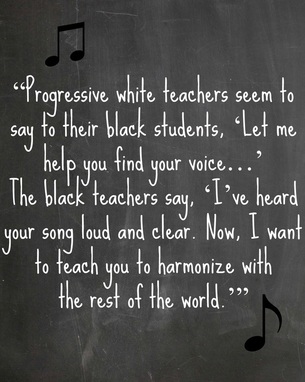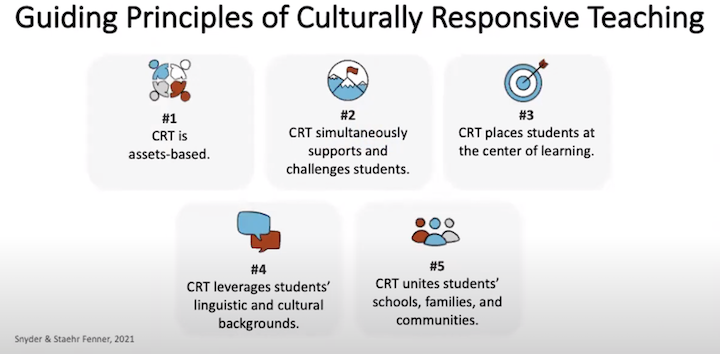The Silenced Dialogue by Lisa D. Delpit
3 Talking Points
- Pg 281: "They wear blinders and earplugs. They only want to go on research they've read that other White people have written. It just doesn't make sense to keep talking to them."
- I feel this in my soul. Sometimes it is overwhelmingly frustrating to talk from experience or with background knowledge that others might not have, and be ignored. These conversations are great examples of what gaslighting is like, by the end you are not sure what happened but you are sure that you were not "heard". My experience has been more towards the ELLs in my classroom. Although I am not an ELL I feel like I am constantly trying to explain best practices with my bilingual lens, and most of the time I am brushed off by monolingual professionals that do not have a background in ESL. So, I go into my room and do what is best for my students, and like Delpit states: be honest with your students about the realities of the culture in power and how to navigate it.
- Pg 290: "She is so boring, boring.* She could do something creative. Instead she just stands there. She can't control the class, doesn't know how to control the class.... I told her I don't know nothin' unless she tells me..."
- This stood out to me because I have heard this before from my students. I am usually the most culturally diverse teacher on my team, at any given year. One year I had a young female teacher from Oregon (she is white), the students hated her and were mean to her. I loved her. She was brilliant, kind, and honestly trying to make a difference. She was my math teacher and her brain was honestly amazing, but the kids didn't like her. When asked why, they stated that she was "too nice", "too soft spoken", and "blah". I then followed up with, why does being nice mean that you hate her? The students couldn't formulate a response back. We talked about how "we" are accustomed to a particular way of interaction with those with power, i.e. parents, teachers, etc. I also tell the students that while I understand what they are saying and where they are coming from (and my approach is direct and "authoritative") they need to understand that not everyone has the same experience. It wouldn't have fit her personality and overall person if she yelled at them. I did talk to her about setting direct instructions as opposed to ask students to make the right choice.
- Pg 293: "And in the meantime, we must take the responsibility to teach, to provide for students who do not already possess them, the additional codes of power."
- All day everyday I am constantly explaining to students the importance of education in relation to the cultural/social expectations in the world they live. We talk about the importance of formats and learning how to express themselves in various situations. I teach them to code switch, and really explain why it's important in relation to my own experiences. In my team of teachers I am the most like my students. I am from an inner city, I speak Spanish, I am the child of immigrants of a Latin American country, I grew up with a single mother, I have received free or reduced lunch my whole life, and I was taught that I had to fight harder than other groups in America. Using these points of similarities I try to educate the students about what I have needed to do to navigate this society. I even express that I am more authentic with them, then say my boyfriend's parents, because they are in the position of power/privilege. I become meeker (they have never seen me "pop off"), softer, less bilingual, and more "American". It's important for me to teach my students about this, because while my teachers never did this for me they helped me in a way that Delpit asks educators to; my teachers gave me the background knowledge to interact with the curriculum in the same way as my white American peers. They were explicit with their expectations in our behavior and academics. All my teachers were white, even my Spanish teachers were white, but they all gave me the education I needed; while my mother continued to foster my education in my Latino culture.
Argument Statement
Lisa D. Delpit argues in this paper that a teacher's responsibility is to give access not only to the content skills but also the language and expectation of the culture of power in a direct and explicit manner.


Clearly, Delpit spoke to you. Amazing way to capture her main ideas and argument.
ReplyDeleteI feel it too and the data part breaks my heart. Even data based on BIPOC is most likely viewed/observed and collected through a white lens and its totally inequitable
ReplyDelete